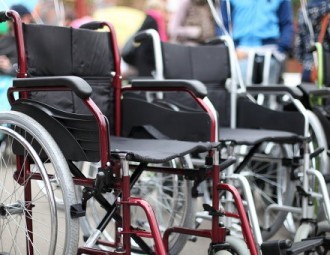Reflecting on acting with unlimited possibilities: main results and future plans

Realization of personal projects, upsurge of motivation and faith in one’s own powers are the main results of the program “Acting with unlimited possibilities” which has been finished lately.
Program “Acting with unlimited possibilities” is being realized by the Office for the Rights of Persons with Disabilities (Belarus) and School of leaders (Poland). Lilia Volina the program’s coordinator and an employee of the Office for the rights of persons with disabilities tells us about the difficulties and successes of the program.
- On what principle were participants chosen for the last stage of the program “Acting with unlimited possibilities”?
- We used individual questionnaires filled by potential participants from different organizations. We were planning to accept 3-4 persons because the main goal of our program this year was to develop organizations and their team potential. Last year we put an accent to participants and development of their leadership and team skills. During the last program we wanted to concentrate on the development and strengthening of organizations. We chose having based on questionnaires the first part of which was about an organization’s work and the second part about a concrete participant or an organization’s employee.
- How many projects were realized on the basis of the educational program? Are you satisfied with the results?
- On the whole 5 projects were realized, but of course each one in different degree. Someone achieved the goal set someone didn’t. The participants themselves admit that they managed to exceed all the expectations. One of such project examples can be the initiative of the team of “Center for assistance to autistic children”. The participants shared: the project grew so much that they hadn’t even expected. Impressions of participants from Lida, Zhitkovichi and Polotsk are very similar. Natilia Pronkina from Polotsk admitted that she was imagining her educational school initiative less grandiose. Elena Strakh from Zhitkovichi considers that they managed to improve cooperation with the regional TSOT. The initiative of PA “BelOI” of the Moskovskiy district of Minsk has also been very successful.
- What difficulties had you faced during the realization of the program?
- In spite of the fact that to my point of view the program was a success we lacked some unity, team spirit. And as I have already said for us it was important to strengthen NGOs through separate participants, to make the teams of employees more prepared and powerful. Sometimes because of deadlines, sometimes because some of the participants were overloaded the activity of some participants of the project was rather low but mentors helped all the time – they tried to do it at moments it was needed. Probably, in the future we will pay more attention to motivation and desire of all the participants to work together. Although, in any program it is difficult to foresee all the difficulties.
Every organization was happy with the results – the realized projects influence the strengthening of their overall potential.
- What was the response of target groups the participants worked with?
- As a rule they took active participation. For example, school initiative in Polotsk was very well accepted by educational establishments – they invited us to read more lectures. Pupils also liked unusual lessons they liked things they had to do together with a trainer and sincerely took all the information on disability.
Zhitkovichi initiative had fears that employees of the local TSON wouldn’t be interested in their initiative. But it wasn’t true. The project who dealt with the “Center for assistance to autistic children” hadn’t faced any problems either.
- What do you personally consider to be the main result of the program “Acting with unlimited possibilities”?
- Personally I think that the organizations, the teams and the participants, who have been involved in projects this year, started to believe in themselves much more. Before it many of them didn’t believe that their work can lead to any positive changes and that they can influence something…
- How do you see the future and development of your program?
- There should be a continuation, because only in this case we will have a maximum effect from the educational program. The next year we will try to take into account some peculiarities, to introduce some changes to the program using the existing experience. There were only two waves of participants of the program “Acting with unlimited possibilities”. I consider that it is very important to continue our work. For some participants it is not only about getting new knowledge but also the possibility to make new acquaintances, possibilities and the way to learn something new from each other.
- Are you planning to attract in the future organizations, which do not work in the sphere of disability? And, for example, to include to the educational programs cyclists who also want to make the architectural environment more accessible…
- The program is open for organizations of persons with disabilities and the ones working with them. This year we had applications from organizations, which are not directly working with problems of persons with disabilities and we considered them as potential participants. But we are interested in motivation in order that it wouldn’t be one-time action. It is important that the trend would develop in an organization after the program is finished and our task is to help to raise the trend to a new level. We want our program to be of a long-term character.
-
03.01
-
07.10
-
22.09
-
17.08
-
12.08
-
30.09



























